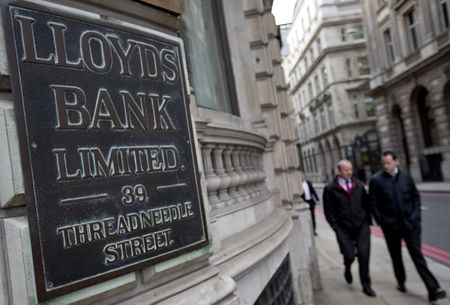By Matt Scuffham
LONDON (Reuters) - Britain has abandoned plans to sell shares in Lloyds Banking Group (L:LLOY) to private retail investors next month because of a decline in the bank's share price, banking industry and political sources told Reuters.
Finance Minister George Osborne had been keen to sell some of the government's remaining 25 percent stake to private investors to let taxpayers share some of the benefit from the bank's return to profit.
But a 15 percent decline in the bank's share price since the start of the year has persuaded Osborne to ditch the idea, the sources said.
The decision significantly reduces the government's chances of selling all its shares, which it sees as a milestone in Britain's recovery from the financial crisis, before the next election in May 2015.
Osborne acted after receiving advice from UK Financial Investments, the body that manages the government's stakes in bailed out banks, the sources said.
UKFI believes that a sale to private retail investors will be easier when the market has more clarity over Lloyds' future dividend prospects. Lloyds has said it will ask Britain's financial regulator for permission to resume dividend payments in the second half of the year.
Private investors traditionally like dividend-paying stocks whereas institutions may be prepared to take a longer-term view.
Sources said the government and UKFI were also influenced by uncertainty created by the Scottish independence vote in September, a forthcoming strategy review by the bank and stress tests being undertaking by regulators later in the year.
A Treasury spokesman said any decisions on share sales would "be determined by value for money and market conditions".
"We want to maximize support for the British economy, get the best value for money for the taxpayer and return the state-owned banks to private ownership," he said.
UKFI has already sold a 13.5 percent stake in the bank, raising 7.4 billion pounds, in two separate sales to financial institutions such as pension funds and insurers in September and March.
However, Lloyds shares have fallen about 15 percent from a high of 86.3 pence in mid-January and closed on Wednesday at 73.7 pence. That is below the 75 pence and 75.5 pence level at which the first two share sales were priced and which sources say are a floor below which UKFI will not sell.
The current price is only marginally above the 73.6 pence average price at which the government bought its shares.
Shares in Lloyds had nearly doubled in the 9 months prior to the January high but have drifted lower since, in part because anticipation among some investors that the bank would begin paying dividends again this year proved over-optimistic.
A sale to retail investors will have had to be priced at a deeper discount than one to institutions only to entice private investors to buy a stock which they could already purchase on the open market.
The first two Lloyds sales were sold at discounts of 3 percent and 4.6 percent to the market price.

(Reporting by Matt Scuffham; editing by David Clarke)